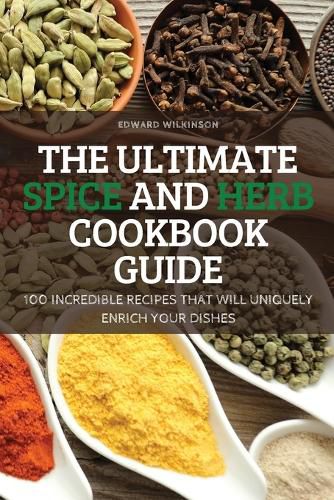Readings Newsletter
Become a Readings Member to make your shopping experience even easier.
Sign in or sign up for free!
You’re not far away from qualifying for FREE standard shipping within Australia
You’ve qualified for FREE standard shipping within Australia
The cart is loading…






This title is printed to order. This book may have been self-published. If so, we cannot guarantee the quality of the content. In the main most books will have gone through the editing process however some may not. We therefore suggest that you be aware of this before ordering this book. If in doubt check either the author or publisher’s details as we are unable to accept any returns unless they are faulty. Please contact us if you have any questions.
Herbs are aromatic edible plants used to add flavour to dishes. Most herbs are used for both culinary and medicinal uses and come from plants that may be used for their leaves, as herbs, and also for their seeds, as spices.
Chefs and home cooks alike use fresh and dried herbs to make both sweet and savory dishes, ranging from rich sauces to light salads and herb-laced baked goods. In addition to their culinary uses, medicinal herbs and their valuable essential oils have been relied on for their health benefits since the middle Ages, ranging from anti-inflammatory and antiviral benefits to skin-clearing topical powers.
When herbs are in season, rejoice in recipes that incorporate heavenly rosemary, basil, dill, mint, oregano, and thyme. Cooking with herbs not only releases great fresh flavors, but also is healthy!
Here, herbs are a main Ingredient, rather than a garnish. Half a cup or more of basil, cilantro, mint, or any other fresh herb can be just the ticket for adding a lively flavor to all sorts of dishes. From chickpea salad with dill to fluffy falafel packed with cilantro and parsley to the most refreshing mint ice cream.
Difference between Using Fresh and Dried Herbs
Fresh herbs are generally preferred over dried herbs for culinary purposes, although there are advantages to using dried herbs. While fresh herbs have a much shorter lifespan, dried herbs can maintain their flavor for up to six months when stored in an airtight container in a dark place at room temperature.
While dried herbs are typically used throughout the cooking process, as prolonged heat and exposure to moisture can draw the flavors out of the herbs, fresh herbs are more commonly added towards the end of the cooking process or as a garnish at the end of cooking.
$9.00 standard shipping within Australia
FREE standard shipping within Australia for orders over $100.00
Express & International shipping calculated at checkout
This title is printed to order. This book may have been self-published. If so, we cannot guarantee the quality of the content. In the main most books will have gone through the editing process however some may not. We therefore suggest that you be aware of this before ordering this book. If in doubt check either the author or publisher’s details as we are unable to accept any returns unless they are faulty. Please contact us if you have any questions.
Herbs are aromatic edible plants used to add flavour to dishes. Most herbs are used for both culinary and medicinal uses and come from plants that may be used for their leaves, as herbs, and also for their seeds, as spices.
Chefs and home cooks alike use fresh and dried herbs to make both sweet and savory dishes, ranging from rich sauces to light salads and herb-laced baked goods. In addition to their culinary uses, medicinal herbs and their valuable essential oils have been relied on for their health benefits since the middle Ages, ranging from anti-inflammatory and antiviral benefits to skin-clearing topical powers.
When herbs are in season, rejoice in recipes that incorporate heavenly rosemary, basil, dill, mint, oregano, and thyme. Cooking with herbs not only releases great fresh flavors, but also is healthy!
Here, herbs are a main Ingredient, rather than a garnish. Half a cup or more of basil, cilantro, mint, or any other fresh herb can be just the ticket for adding a lively flavor to all sorts of dishes. From chickpea salad with dill to fluffy falafel packed with cilantro and parsley to the most refreshing mint ice cream.
Difference between Using Fresh and Dried Herbs
Fresh herbs are generally preferred over dried herbs for culinary purposes, although there are advantages to using dried herbs. While fresh herbs have a much shorter lifespan, dried herbs can maintain their flavor for up to six months when stored in an airtight container in a dark place at room temperature.
While dried herbs are typically used throughout the cooking process, as prolonged heat and exposure to moisture can draw the flavors out of the herbs, fresh herbs are more commonly added towards the end of the cooking process or as a garnish at the end of cooking.